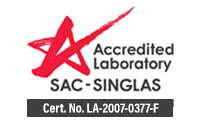Building Health Check

Indoor air quality in offices and buildings has a huge impact on businesses and employees because it can influence the health, comfort, well being and productivity of building occupants. Hence, it is important to ascertain the indoor air quality in the working environment.
IAQ building or office audits encompass the monitoring of:
- Thermal comfort parameters such as air temperature, relative humidity and air movement
- Airborne microbial counts such as total viable bacteria count and total viable mold count
- Identification of microorganisms that is dwelling in the indoor environment
- Respirable suspended dust particulates (RSP)
- Chemical parameters such as concentrations of carbon dioxide (CO2), Carbon monoxide (CO), formaldehyde (HCHO), total volatile organic compounds (TVOCs), etc.
- In some cases, it may be important to assess the air exchange rate, ventilation effectiveness and age of air, occupancy patterns and internal loads of the building as well.
Testing of the above IAQ parameters will give us a good understanding of the indoor environment and possibly indicate if the environment is well maintained or at risk of being affected by Sick Building Syndrome (SBS), or Building Related Illness (BRI).
Sick Building Syndrome and Building-Related Illness
The term “Sick Building Syndrome” (SBS) is used to describe situations in which building occupants experience health effects such as headaches or respiratory problems usually caused by unhealthy factors in the indoor environment as such poor ventilation or air conditioning systems.
The complaints may be localized to a particular room area or zone or may be widespread throughout the building.
In contrast, the term “Building Related Illness” (BRI) is used when symptoms of diagnosable illnesses are identified and can be attributed directly to the presence of airborne building contaminants.


